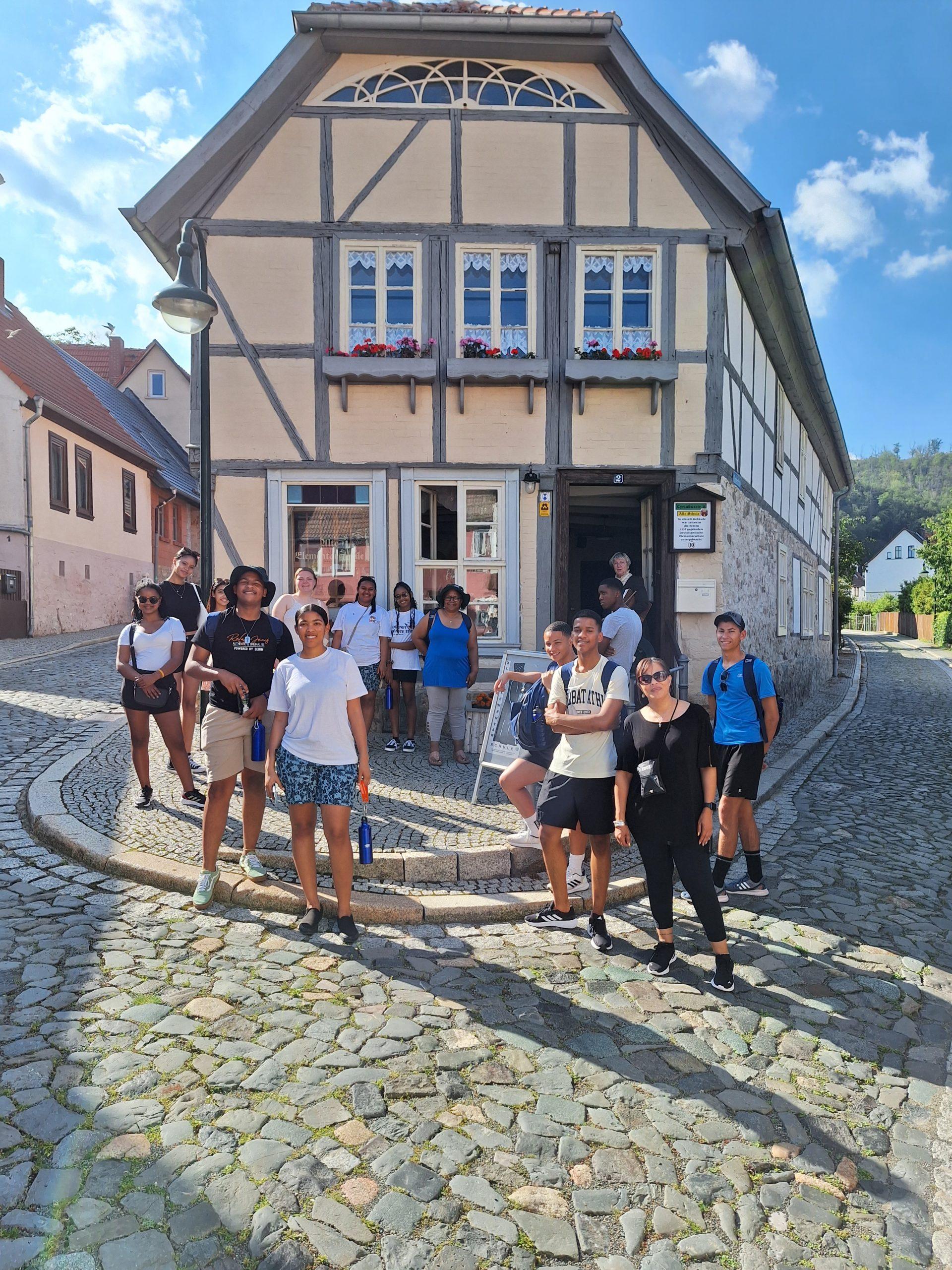The Cape Winelands District Municipality (CWDM) and the German NGO, KiEZ, hosted the annual youth exchange programme that enabled grade 11 pupils from the district to visit Germany to develop leadership skills and foster cultural understanding. KiEZ was established in 1999 with the aim to create an improved understanding of democracy by developing leadership in youth through cultural exchange.
The only costs borne by the learners were for air tickets and pocket money – accommodation, meals, entrance tickets and transport were funded by the German government via the NGO. After incredible fundraising efforts, nerve-racking visits to the Department of Home Affairs and the visa offices, the packing and arrangements, the group of 12 learners from schools in the Langeberg area left on 19 August 2023 with their chaperones.
For many members of the group, it was a trip of firsts. First time outside South Africa’s borders, first time in an airplane and, for all of them, the first time visiting Germany.
The group was based in Gernrode, a small town in the Sachsen-Anhalt District that used to be part of the Eastern Bloc. From here the group visited Quedlinburg with its gorgeous cobblestoned streets and historical market area as well as the GutsMuths Gimnasium, the high school attended by many of their fellow German students.
The days were very busy with visits to Magdasburg, which included an exciting day at the Millenium Dome and other activities at the Kletterpark, a visit to the cathedral, which at 800 years old is the oldest Gothic cathedral in Germany. There were visits to museums, and the home of the poet Johan Gleim proved to be a highlight. The team took to public transport with aplomb and with a little help from the patient translator, they were soon whizzing around to Halberstadt, Wernigerode and other towns.
The pro-active recycling programme was well received by the learners, while practices such as not talking loudly on the bus were a little more difficult to grasps. And of course, true to our South African spirit, there were many comments about the difference in food with one of the learners commenting, “Can’t I just make them curry-mince vetkoeke?” The learners had the opportunity to spend a weekend with their German ‘family’, from which each child returned with a wonderful story. “I was on the autobahn”, “I braaied in German”, “Wow, we went on the cable car”, and so on.
The days passed quickly and without realising it, everyone was speaking smatterings of German, had become walking machines, and had shared sensitivities with new friends.
After a few tearful goodbyes, the group started the long trip home, with hearts and minds full of new memories, adventures and great experiences.
In October 2023, the same NGO will accompany 12 learners from Germany on their visit to the Cape Winelands. Much planning has been under way by the innovative group of learners from the Langeberg to ensure that the visitors get to experience all the best parts of the CWDM while they are here.
(…and yes, curry-mince vetkoek, koesisters and milk tart are all on the menu!).
The KiEZ/Cape Winelands District Municipality partnership has over the past six years afforded 49 learners from high schools in Breede Valley, Drakenstein, Witzenberg and the Langeberg the opportunity to form part of the exchange. No trips took place during the Covid-19 pandemic.
The contract is renewed annually and is supported by Western Cape Education in the Cape Winelands who, together with the schools in a given area, select eligible learners.
There is no guarantee at this stage that the partnership will be renewed; however, should it be, it is envisaged that the municipal area of Stellenbosch will have the opportunity to send learners to Germany in August 2024.
This year’s exchange also included five firefighters hailing from the CWDM and the Stellenbosch and Langeberg municipalities.
Under the leadership of Chief Fire Officer, Wayne Josias, Regional Commander for Training, Heinrich Louw, and supported by Craig van Reenan of Stellenbosch and Fernando Hoofd of Langeberg, the group aimed to evaluate the situation in rural Germany and assist with designing a training programme in the prevention of fires and conservation of the rich forests in these parts.
We interviewed Heinrich Louw about the group’s experience:
- How did this knowledge exchange come about?
The CWDM had already established a partnership with the German NGO KiEZ for quite some time. The core function of this foundation is the development of youth through cultural exchanges and leadership programmes, and that is how they became aware of the CWDM Fire Services and its Training Academy.
In rural areas of Germany, as in most other countries, the fighting of rural and wildland fires is not subsidised by the government. It’s a function managed by volunteers who need to be trained. KiEZ approached their government to utilise the existing partnership to provide funds for a training programme for their volunteer fire services located in rural areas. After this approval was granted, KiEZ approached us to explore the possibility of developing a training course for volunteers. During this first visit, the focus was on identifying gaps, outlining a training programme or schedule, and determining the course requirements for firefighters to combat field or ‘wildland fires’.
2. Where in Germany were you, and for how long?
We were in the rural district of Sachsen-Anhalt, located in former East Germany. It’s a very beautiful area with various natural forests. We stayed in the area for 10 days and met with various fire services and fire chiefs. It was a very busy 10 days!
3. How does the experience of the CWDM Fire Services differ from the fire services in Sachsen-Anhalt?
The CWDM has one of the best records in wildland fire management worldwide. On the one hand, this is because we receive a lot of practice given our large area of natural vegetation and the very dry, hot summers. On the other hand, it’s because we have well-trained and well-equipped firefighting teams and excellent relationships with our partners who support services on the ground and in the air.
In contrast, Europe doesn’t have much experience in managing wildland fires as their climate and conditions differ from ours. But, as the impact of climate change increases, the number and severity of wildland fires are growing and their services simply aren’t equipped to handle these types of fires. Europe is increasingly turning to South Africa and Australia for advice on fire prevention and management. Our ground teams regularly assist with fires in America, Northern Africa, and most recently in Canada.
The training facilities at their central fire service were particularly impressive but focused heavily on structural fires. The fire services have excellent equipment and training; it’s not that they lack capacity, willingness or even resources, but rather that the nature of the fires that they need to manage is changing.
4. What are the next plans?
At this stage, everyone is taking a bit of a breather, but as we understand it, a group of firefighters will travel to our region during our fire season that runs from November to the end of April to experience our active services firsthand.
From there, we will get a better idea for future training. It’s actually an emergency for them; due to climate change, the forests in Germany have become a habitat for a type of beetle that causes trees to die, and these dead trees are excellent fuel for fires. Although there are plans to address the beetle situation, the number of dead trees and the threat they pose to forests is a major concern.
5. Any final words?
It was truly a wonderful learning opportunity for us to see the conditions in other countries. We often tend to think that we in South Africa lag far behind the first-world countries, and yet, here we are not only ahead in terms of expertise but also because we are so willing to share our knowledge. On a final note, it was an honour to get to know firefighters from another country and once again realise that firefighters are one big family, and our values and love for the service transcend all other differences.
“We were so excited to be sharing not only our wonderful diversity through the youth exchange, but also our firefighting skills with the world!” stated the CWDM’s Executive Mayor Elna von Schlicht at the last meeting before the group departed. “The projects that had developed as a result of our partnership with KiEZ are testimony to the importance of intergovernmental cooperation. I can’t wait to hear how the trip went and all that they experienced.”


